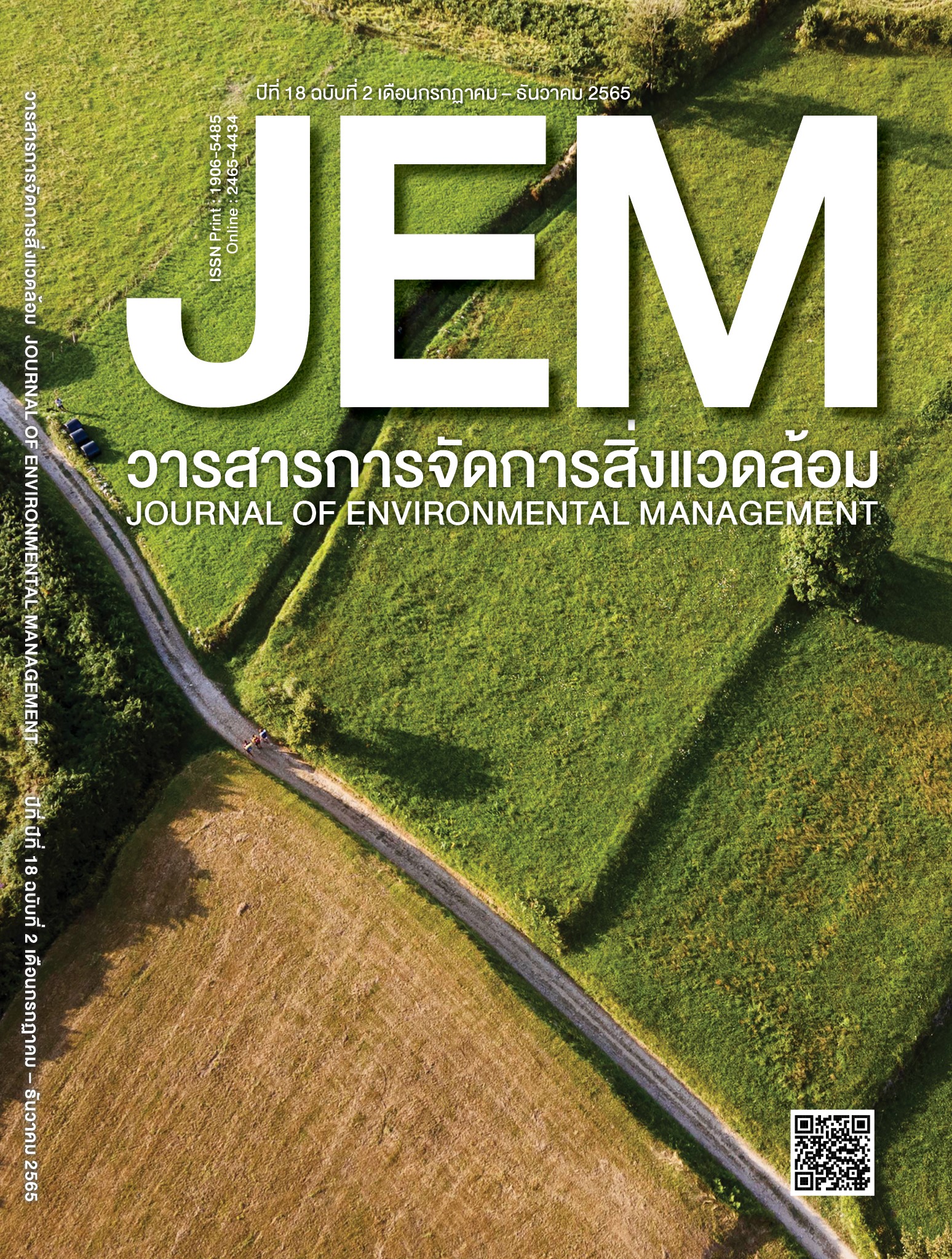โครงการเกษตรอาหารกลางวันให้แก่โรงเรียนที่ขาดแคลนตามแนวทางปรัชญาของเศรษฐกิจพอเพียง
DOI:
https://doi.org/10.14456/jem.2022.10คำสำคัญ:
โครงการเกษตร, อาหารกลางวัน, โรงเรียนที่ขาดแคลน, แนวทางปรัชญาของเศรษฐกิจพอเพียงบทคัดย่อ
การวิจัยนี้มีวัตถุประสงค์เพื่อศึกษาผลการดำเนินโครงการเกษตรอาหารกลางวันให้แก่โรงเรียนที่ขาดแคลนโดยนำปรัชญาของเศรษฐกิจพอเพียงมาใช้เป็นแนวทางการดำเนินโครงการ มีโรงเรียนในพื้นที่จังหวัดนครราชสีมาและพื้นที่จังหวัดสระบุรีเข้าร่วมโครงการ จำนวน 29 แห่ง โครงการใช้ 3 หลักการของปรัชญาเศรษฐกิจพอเพียง คือ หลักความพอประมาณ หลักความมีเหตุผล และหลักภูมิคุ้มกันในการเปิดโอกาสให้ทางโรงเรียนเลือกรูปแบบกิจกรรมตามความต้องการของแต่ละโรงเรียน โดยการจัดกิจกรรมอบรมถ่ายทอดความรู้ให้แก่ครูและนักเรียนทั้งภาคบรรยายและติดตามระหว่างการปฏิบัติเป็นการเสริมสร้างเงื่อนไขความรู้และคุณธรรม เก็บข้อมูลจากแบบสอบถาม การสัมภาษณ์ และการสังเกต สถิติที่ใช้วิเคราะห์คือสถิติเชิงพรรณนาร่วมกับข้อมูลปริมาณและมูลค่าผลผลิตที่เกิดจากกิจกรรมโครงการ ผลการศึกษา พบว่า นักเรียนและครูที่เข้าฝึกอบรมกิจกรรมด้านการเกษตรมีความรู้ สามารถนำไปปฏิบัติได้จริง คิดเป็นร้อยละ 95.45 โดยผลผลิตทั้งหมดที่เกิดในโครงการคิดเป็นมูลค่า 457,035 บาท ซึ่งร้อยละ 70.00 ของผลผลิตรวมทั้งหมด นำไปเป็นวัตถุดิบประกอบอาหารกลางวัน สามารถจำแนกตามกิจกรรมได้ดังนี้ ผักปลูกด้วยระบบไฮโดโปรนิกส์และปลูกบนดินคิดเป็นร้อยละ 70.10 ไข่ไก่ร้อยละ 70.68 ปลาร้อยละ 71.94 และเห็ดนางฟ้าภูฐานร้อยละ 72.12 โรงเรียนได้บูรณาการกิจกรรมของโครงการเข้ากับการเรียนการสอนเป็นหลักสูตรเสริมทักษะการงานและอาชีพร้อยละ 68.18
เอกสารอ้างอิง
Keawdounglek, V. (2019). Food safety and environmental management. [In Thai]. Journal of Environmental Management, 15(2), 106-125.
Khomsupa, K., & Suvannagoot, R. (2017). Results of activity practice based on the sufficiency economy philosophy of schools under the Mueang district municipality, Nakhon Phanom province. [In Thai]. Nakhon Phanom University Journal, 7(3), 36-43.
Klinubon, S. (2020). The study of participation of community contributed to the success of community development guided by the philosophy of sufficiency economy at Banhuakhaojeen, tambon Hoyyangtone, Paktor district, Ratchaburi province. [In Thai]. Journal of Social Sciences, 9(2), 108-118.
Pa-Eye, A. (2021). Development of financial health model for teachers according to sufficiency economy. [In Thai]. Journal of Social Sciences, 10(2), 110-121.
Pailoplee, S. (2019a). 21 Nakhon Ratchasima: Geography.Map. [In Thai]. Retrieved March 26, 2022, from http://www.mitrearth.org/m21-nakhon-ratchasima/
Pailoplee, S. (2019b). 64 Saraburi: Geography.Map. [In Thai]. Retrieved March 26, 2022, from http://www.mitrearth.org/m64-saraburi/
Rodkroh, P. (2017). The development of elementary students under the philosophy of sufficiency economy. [In Thai]. Journal of Education Studies, 45(2), 182-194.
Srisuk, N., & Krajangjaeng, B. (2022). Model development on community empowerment management according to sufficiency economy philosophy for Ban Khtong Arang ideal community, Sakaew province. [In Thai]. Rajabhat Rambhai Barni Research Journal, 16(1), 97-105.
Thunthana, Y., Praditsil, C., & Saensanoh, C. (2022). Learning processes and sustainable development according to the philosophy of sufficiency economy: a case study of the pawa village agroforestry community, Kaeng Hang Maeo district, Chanthaburi province. [In Thai]. Rajabhat Rambhai Barni Research Journal, 16(1), 15-25.
Yimchang, A. (2020). Development of life skills development model for pre-school and early children based on sufficiency economy philosophy. [In Thai]. Journal of Graduate Studies in Northern Rajabhat Universities, 10(1), 33-48.



